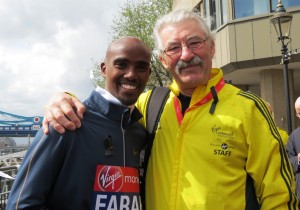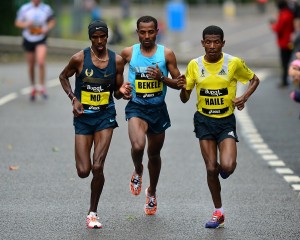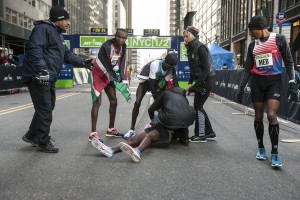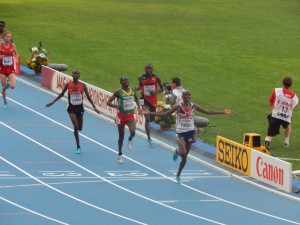Sorry, Mo Farah Fans: Five Reasons Why Mo Isn’t Winning The 2014 Virgin London Marathon
by LetsRun.com
April 9, 2014
Last week, marathons fans enjoyed a decent appetizer as Kenenisa Bekele had a successful marathon debut in Paris.
This week, however, we’re moving from an appetizer at a three-star restaurant to a five-course meal at a five-star restaurant as track stars Tirunesh Dibaba and Mo Farah debut at the 2014 Virgin Money London Marathon.
Our men’s and women’s marathon previews are in the works, but wanted to start with a piece devoted to the star of the weekend – Mo Farah. The hype in Britain surrounding his debut is big but we bring it down a little and give you five reasons why Mo Farah isn’t winning on Sunday.
1) 3:28:81 (Mo Farah’s Too Good At 1,500).
3:28.81 is the 1,500-meter PR of Mo Farah thanks to his shocking run in Monaco last summer.
Quite honestly, that run by Farah ABSOLUTELY STUNNED us. He’s now the sixth-fastest man in history at the 1,500.
Immediately, when he ran that time, we though to ourselves, “How can someone that middle-distance-oriented also be great at the marathon?”
When God (Darwin for you non believers) hands out talent, he or she doesn’t hand it out in every event. As LetsRun.com coaching guru John Kellogg said, “Something’s got to give. Nobody can be the best at everything. You’d think that 3:28 would indicate better track ability than marathon ability.”
People naturally are better at one event or another. Matthew Centrowitz is way better at the 1,500 than 10,000. Jeremy Wariner is way better at the 400 than 200. If we asked you if you think Centro can beat Galen Rupp at 10,000, you’d laugh at us. Well, Farah is way faster than Centro at 1,500 and he’s trying to take down the world’s best at 26.2.
On an absolute scale, Farah is at least as good at the 1,500 as he is at the 10,000. His 1,500 time is actually higher up on the all-time list than in the 10,000 (#15 26:46.57) (but Farah has never gone all-out in a 10,000 in his prime (for the record, he’s #31 at 5,000 at 12:53.11)).
It just doesn’t make logical or physiological sense that someone who is an all-time great at 1,500 would also be an all-time great at 26.2. If he’s not one of the all-time greats at the marathon, then he’s not winning the 2014 London Marathon, as London is always the most difficult professional marathon on the planet to win.
Now that’s not to say that there haven’t been good 1,500/marathon men in the past. They have existed but have been few and far between. Rod Dixon (3:33) and Haile Gebrselassie (3:31.76) both were elite at 1,500 and 26.2. Dixon won Olympic bronze in the 1,500 at the 1972 Games. He also won New York in 2:08:59 in 1983.
Gebrselassie won World Indoor 1,500 gold in 1999 and of course later was the first sub-2:04:00 marathoner in history. Are we really ready to compare Farah to Haile Gebrselassie? Farah’s accomplishments have been mind-boggling the last few years since turning to Alberto Salazar for guidance.
That’s a still a BIG, BIG step to make.
Even if you believe Farah is going to be Gebrselassie-good in the marathon, do you know what happened when Gebrselassie made his marathon debut in London in 2002?
He got spanked and finished third in 2:06:35, and that was when marathoning was SIGNIFICANTLY less deep and competitive as it is now. In 2002, nine men broke 2:07:00 in the marathon for the entire year. In 2012, 29 men did so.
2) Mo Farah’s Lost His Last Two Races
Alberto Salazar, Mo Farah, and even Steve Cram have all discounted the fact that Mo Farah passed out after finishing his last race, when he was second to fellow 2014 London entrant Geoffrey Mutai at the 2014 NYC Half Marathon. Not us. It’s not normal for human beings to pass out after running events.
Soon after, Salazar ended up going to Kenya for only the second time in his life to supervise Mo’s taper. Was that planned all along or was Salazar concerned? It doesn’t matter to us. We are concerned that he passed out.
Now forget about passing out. Farah has lost his last two races, both of which were half marathons – the 2014 NYC Half in March and the 2013 Great North Run in September.
Losing to Geoffrey Mutai and Kenenisa Bekele, two of the all-time greats, is nothing to be ashamed about. One doesn’t need to be in absolute tip top half marathon shape to be great at the marathon, and likely doesn’t want to be. However, the losses only reinforce our #1 point and concern, Farah’s far from proving he’s got great long distance endurance.
Over the last two years, Farah’s lost exactly one of 12 track 5,000 or 10,000s that’s he’s run outdoors and yet he’s lost the last two half marathons he’s run.
Not everyone who is great at 10,000 is great at the marathon. Ron Clarke was a former 10,000 world record holder whose PR was just 2:20:26 in the marathon.
 Double Olympic champion Mo Farah with former Virgin London Marathon race director Dave Bedford (photo by Jane Monti for Race Results Weekly)
Double Olympic champion Mo Farah with former Virgin London Marathon race director Dave Bedford (photo by Jane Monti for Race Results Weekly)
3) Mo Farah’s Lack Of Super-Fast Times In Both The 5,000 And 10,000/Lack Of Experience In Time Trials
It’s hard to find much to criticize about Farah’s racing the last few years as he’s been utterly brilliant outdoors in both the 5,000 and 10,000. The one critique would be that Farah, unlike Gebrselassie and Bekele in their heydays, hasn’t run particularly fast. Last year for example, Farah’s seasonal bests were just 13:05.88 for 5,000 and 27:22.81 for 10,000.
Winning championships, not time, has been the focus. Farah has proven himself to be unbeatable in non-rabbitted championship races. Now that he’s run 3:28 for 1,500, it’s become obvious as to why as everyone now thinks, “Of course the 3:28 guy can outkick everyone in a tactical race.”
Even when Farah ran his 26:46 10,000 PR at Prefontaine in 2011, he stayed in the back of the pack for much of the race and then moved up and surprisingly outkicked everyone late. The fact that he hasn’t run super-fast (close to the WR) also reinforces our #1 fear – the fear that he’s more mid-d oriented than 26.2 oriented.
London certainly isn’t going to be slow. In a marathon like London, the runners are under pace pressure from practically the very beginning.
At Worlds on the track, Farah often stays in the back and just runs his own race, saving energy and avoiding pointless pace changes early on. We imagine Farah will likely try to outsmart people in the marathon as well and avoid pointless early surges. That’s smart as the huge drops in pace (like Wilson Kipsang in the 2012 Olympics) in the middle of marathons are a waste of energy. But at some point, if victory is the goal, Farah is going to have to mix it up and go with whatever is happening up front. He has very little experience of hanging on to extreme pressure at even 5,000 and 10,000 meters – let alone for 42,194.988 meters.
It’s hard to think that running an even pace and waiting to control the last 1k will work in a 42.2 km race.
“I imagine that London will be like the Olympic marathon,” said John Kellogg. “Running even and working your way up through the field is a great strategy for maybe picking off a bronze, in this case third, but not usually for winning gold.”
That’s true unless the pace is suicidal up front. Farah’s best chance for victory likely is if we see a repeat of last year’s London race where the leaders really went for it (61:34 first half) and all blew up. The winning time last year was over 2:06. If we’re Salazar, we’d tell Farah under no circumstances should he go out under 62:15. The course record is 2:04:40 – go try to run that.
Update: An article has come out in The Telegraph and apparently great minds think alike. Check out this excerpt from Simon Hart’s piece:
The lead group of athletes through the halfway point at 61 min 45 sec, which would put them within striking distance of Wilson Kipsang’s world record of 2hr 3 min 23 sec.
But Salazar believes that pace will be too hot for Farah in his first ever marathon and has asked for the double world and Olympic champion to be paced to the halfway mark in 62 min 15 sec. That would still put Farah on target for a course record.
4) Tiger Woods Math
When Tiger Woods was at his prime in golf, the oft-asked question was, “Who do you want – Tiger or the field?”
The smart answer from a betting perspective was, “The field.” In 2000 and 2001, Tiger did manage to win 50% of the majors, but good luck repeating that.
“Who do you want – ANY one runner or the field in London?” The field is the smart choice.
Marathoning is too unpredictable and London is too stacked to think that anyone in the men’s field has a 50% chance to win. Considering Mo Farah is 100% unproven at the marathon distance, it’s even easier to predict with confidence that he’s not winning on Sunday. In a 5,000 or 10,000 on the men’s side, there are only two or three people most experts can even fathom winning, in a marathon like London, that number at least doubles. Thus, predicting the Mo Farah isn’t going to win isn’t going out on a limb at all; it’s actually being conservative.
5) Farah’s Own Words
This week, Kenenisa Bekele and Mo Farah both discussed how hard it is to win in London.
In his pre-race press conference on Tuesday, Farah resorted to joking about how easy the field was .
“In terms of the field, I just definitely want to thank Dave Bedford for making an easy race for me, because it would be nice to just go out there and not think about anything, to just think about time,” said Farah (video can be watch here).
“This race is also completely different to Paris. It was Bekele’s first marathon but there was no one [for him] to worry about. There was hardly anyone there,” said Farah according to Simon Hart. “He was going in with a different mindset compared to London. London is by far the toughest field we’ve ever seen, with guys who can run world records.”
Then Farah turned the conversation to the #1 goal of breaking the British record of 2:07:13. You don’t lower expectations like that unless you realize you face a STIFF, STIFF test. “My aim is to go after the British record and see what comes with it, and to respect the distance.”
Conclusion
Don’t misunderstand us. We’re not ripping on Farah when we say he’s not winning on Sunday. And we’re not saying he’s not going to run well.
As John Kellogg said, “I can’t think of any reason why he wouldn’t be good at the marathon. He just likely might not be the best – and only the best win in London.”
We do know one thing. There’s a reason why they run the race. It’s must-watch TV.
A win certainly isn’t inconceivable. If you’d asked us last summer, “Which is more likely – Mo Farah runs 3:28 for 1,500 or he wins the 2014 Virgin Money London Marathon?,” we’d have said, “Wins London.”
Farah’s results have already stopped making logical sense for us. If he does end up being as good at the marathon as he is at 1,500, then the comparisons to Haile G certainly are valid.
More: Messageboard Discussion: Truly incredible: Great minds think alike: Al Sal agrees with LetsRun: Mo Farah will go out behind lead pack in 62:15
LRC Archive: 2014 NYC Half Coverage
*2013 London Marathon: 2013 London Marathon Men’s Race: Marathon Gods 1, Distance Runners 0
*LRC Kenenisa Bekele Holds Off Mo Farah In One Of The Most Thrilling Road Races In History
*2012 Olympics: The Unheralded Stephen Kiprotich Of Uganda Stuns The Field And Wins The 2012 Olympic Men’s Marathon



